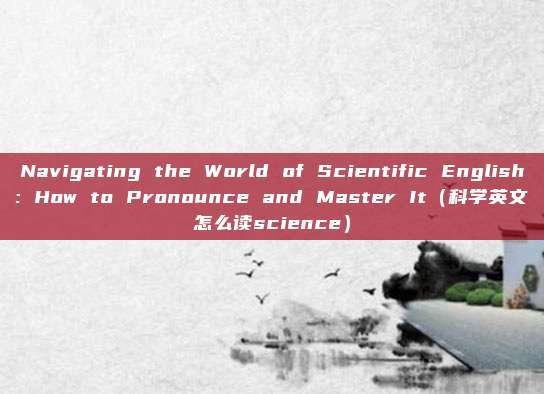Navigating the World of Scientific English: How to Pronounce and Master It(科学英文怎么读science)
温馨提示:这篇文章已超过222天没有更新,请注意相关的内容是否还可用!
Introduction:
In the rapidly evolving global landscape of scientific research and communication, proficiency in scientific English has become an invaluable asset. Whether you are a student, a researcher, or a professional in the field, understanding how to pronounce scientific English terms correctly is crucial for effective communication and academic success. This article delves into the intricacies of pronouncing scientific English and provides practical tips for mastering this specialized language.
Paragraph 1: The Importance of Pronunciation
The correct pronunciation of scientific English terms is essential for several reasons. Firstly, it enhances clarity and comprehension in academic discussions. Mispronunciation can lead to misunderstandings, which can be detrimental to research progress and collaboration. Secondly, a clear pronunciation can leave a positive impression on peers and mentors, potentially opening doors to networking and career opportunities. Lastly, as scientific English is often the lingua franca in international scientific circles, proper pronunciation can help bridge language barriers.

Paragraph 2: Common Challenges in Pronouncing Scientific English
Pronouncing scientific English can be challenging, especially for those not native speakers. Some common difficulties include:
1、Non-native accent: The accent of the speaker can affect the clarity and correctness of pronunciation.
2、Specialized vocabulary: Scientific English contains many technical terms that may not be commonly used in everyday language.
3、Word stress: Understanding the correct stress patterns in scientific terms is crucial for proper pronunciation.
Paragraph 3: Tips for Pronouncing Scientific English
To master the pronunciation of scientific English, consider the following tips:
1、Practice regularly: Just like any language skill, consistent practice is key. Dedicate time each day to practice pronunciation, especially of new or challenging terms.
2、Listen and mimic: Listen to native speakers or audio recordings of scientific English. Mimic their pronunciation to train your ear and mouth.
3、Use resources: Utilize dictionaries and online resources that provide audio pronunciations of scientific terms.
4、Work with a tutor: If possible, seek the help of a language tutor or join a study group to practice pronunciation with others.
Paragraph 4: Pronunciation Resources
To assist in mastering scientific English pronunciation, here are some valuable resources:
1、Oxford English Dictionary (OED): The OED provides detailed entries, including pronunciation, for a wide range of scientific terms.
2、Merriam-Webster Dictionary: Merriam-Webster offers pronunciation guides for scientific words, making it easier to understand and practice.
3、BBC Learning English: This resource offers pronunciation practice for a variety of topics, including science and technology.
4、Google Scholar: Use Google Scholar to find research papers and articles that discuss scientific terms and their pronunciation.
Paragraph 5: Conclusion
Mastering the pronunciation of scientific English is an important step in becoming a proficient scientific communicator. By practicing regularly, utilizing available resources, and seeking guidance when needed, you can enhance your pronunciation skills and contribute effectively to the global scientific community. Remember, effective communication is at the heart of scientific progress, and proper pronunciation can make all the difference.
References:
- National Science Foundation (NSF). (2020). NSF Science & Engineering Indicators 2018. Retrieved from https://www.nsf.gov/statistics/seind18/index.jsp
- American Association for the Advancement of Science (AAAS). (2019). The State of Science. Retrieved from https://www.aaas.org/sites/default/files/page-content/the-state-of-science-2019.pdf
网站文章、图片来源于网络,以不营利的目的分享经验知识,版权归原作者所有。如有侵权请联系删除!





还没有评论,来说两句吧...